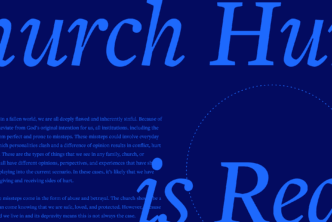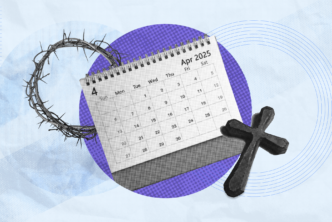How many different ways can we apologize to God? Quite a few, actually. And in the ancient prayers of God’s people—in Scripture and outside it—their focus quite often turned to confession or its many related expressions: remorse, guilt, regret, contrition, repentance.
But confession back then could also easily rise to a level that makes current-day believers a little uneasy. At a time when positive self-image is seen as a necessary component of mental health, who’s ready to bow down in the dust? Early believers certainly were.
So we wonder: What lay behind the deep, soul-searching confessions that played so large a part in their spiritual experience? Can we still pray the same way? Should we? Or what can we learn from their prayers of confession that might apply to us?
Let’s wade into just a few of these venerable prayers for a clue. While they’re pulled from a variety of sources, most are edited and excerpted from Fount of Heaven: Prayers of the Early Church and Piercing Heaven: Prayers of the Puritans. Both volumes in the “Prayers of the Church” series are available from Logos in digital or print versions.
1. Daniel’s confession: We need forgiveness—now!
This short portion is pulled from the prophet Daniel’s longer prayer for his people (cf. Dan 9). His tone is clearly desperate as he begs the Lord for grace and restoration.
O my God, incline your ear and hear. … For we do not present our pleas before you because of our righteousness, but because of your great mercy.
O Lord, hear; O Lord, forgive. O Lord, pay attention and act. Delay not, for your own sake, O my God, because your city and your people are called by your name.1
2. Clement’s confession: Your truth will clean us up
Born around AD 35, Clement of Rome may have been the same Clement that the apostle Paul mentioned in Philippians 4. And in a pastoral letter to believers in Corinth, Clement included this confession:
You who are faithful throughout all generations, righteous in your judgments, marvelous in strength and excellence. …
You who are good, and faithful toward those who trust in you. …
You who show pity and compassion. …
Forgive us our sins, our unrighteousness, our transgressions, and our shortcomings. Do not hold us to account for every sin, but cleanse us with the cleansing of your truth. Guide our steps to walk in holiness, righteousness, and singleness of heart. Help us to do those things that are good and pleasing in your sight. Amen.2
3. Confession in the fourth-century church
In the Apostolic Constitutions (a collection of prayers and liturgical instructions dating to about the year 375), we find this vivid prayer of confession and repentance:
Almighty, eternal God, look down upon us as we bow the neck of our souls and our bodies to you. You do not want us to die as sinners. You desire repentance, instead. You want us to turn from our wicked ways, and live.
You want all people to be saved, and acknowledge the truth. You once accepted the repentance of the people of Nineveh. And as in the parable of the prodigal son, where the father accepted back the son who repented after he had squandered his inheritance in sinful living—now would you accept our repentance as we come before you?
For we all sin. But “If you, Lord, kept a record of sins, Lord, who could stand? But with you there is forgiveness” (Psalm 130:3–4).
Restore us to your fellowship, in your Church. Restore us to dignity and honor, through Christ our Lord and Savior, amen.3
4. A foot-washing confession
One of the most influential church leaders of the fourth century, bishop Ambrose of Milan (340–397), described the central role of humble submission in confession when he prayed this way:
Lord Jesus, you will to wash our feet, as you said to Peter—and to all the faithful, “Unless I wash you, you have no part with me” (John 13:8).
Come then, Lord Jesus. Clothe us with your mercy and your everlasting life. Pour water into the basin, and wash not only our feet but also our head. And not only the body, but also the footsteps of my soul. I want to put off all the filth of my frailty.
As a servant, you washed the feet of your disciples. As God, you send dew from heaven. And not only do you wash the feet, but you also invite us to sit down with you, and you exhort us by saying, “You call me ‘Teacher,’ and ‘Lord,’ and rightly so, for that is what I am. Now that I, your Lord and Teacher, have washed your feet, you also should wash one another’s feet” (John 13:13–14). So I want to wash the feet of my brothers and sisters. I want to fulfill your command. I will not be ashamed nor disdain what you did first. This is the mystery of humility: While washing away the dirt of others, so is my own washed away. Amen.4
5. Confession from the sin-pool
And then we come to the Puritan renewal movement, which produced some of church history’s bravest pastors and theologians. They’re noted for their no-compromise take on confession and repentance. Consider, for example, the prayer of Joseph Alleine (1634–1668), who wrote:
My heart is a sin-pool; I cannot even count the swarms of sinful thoughts, words, and actions that have flowed from it. My head and my heart are full from the load of guilt that is on my soul. My mind and body are full of sin.
What a mess I am in! My soul is within a step of death. But is there any remedy for such woeful misery? Any mercy?
Yes! As sure as your promise is true, God, I will have pardon and mercy yet—if I now genuinely, and without reservation, turn by Christ to you.
So I thank you upon the bended knees of my soul, O most merciful Jehovah, that your patience has waited for me. Because if I would have died as I was before, I would have perished forever.
And now I adore your grace, and accept your mercy. I renounce all my sins, and resolve by your grace to set myself against them, and to follow you in holiness and righteousness all the days of my life. Amen.5
6. The blushing confession
Matthew Henry (1662–1714) wrote a famous Bible commentary that is still commonly used today. Echoing in places that familiar language from the parable of the prodigal son, he confessed that:
We are ashamed, Lord, and we blush to lift up our faces before you. Our sins increase over our head, and our trespasses rise up unto the heavens. When our eyes have seen the King, the Lord of Hosts, we have reason to cry out, “Woe unto us, for we are undone!”
We know that we have sinned, Father, against heaven and before you, and are no more worthy to be called your children. But there is forgiveness, mercy, and redemption with you. You will not despise a broken and a contrite heart.
Though heaven is your throne, and the earth your footstool, still you will look to the poor and humble person who trembles at your word. You revive the spirit of the humble, and the heart of the contrite.
The ones who cover their sins will not prosper, yet those that confess and forsake them will find mercy. You have said that if we confess our sins, you are faithful and just to forgive us our sins, and to cleanse us from all unrighteousness. Amen.6
7. A Puritan lament: Break my heart!
Richard Alleine (Joseph Alleine’s uncle, c. 1610–1681) went beyond merely blushing at his sin. Way beyond. He recorded this heart-wrenching prayer of confession and lament:
I mourn, Lord, and I lament. I weep, but it is because I cannot mourn or lament as I should. If I could mourn as I ought, I would be comforted. If I could weep, I would rejoice. If I could sigh, I would sing. If I could lament, I would live.
But I die. I die, and my heart dies within me, because I cannot cry. I cry, Lord, but not for sin. I cry, I beg for tears for sin. I cry, Lord, my calamities cry, my bones cry, my soul cries, my sins cry, “Lord, for a broken heart.”
But look: I am not broken yet.
The rocks tear apart, the earth quakes, the heavens drop, the clouds weep, the sun will blush, the moon be ashamed, the foundations of the earth will tremble at the presence of the Lord. But this heart neither breaks nor trembles. If only I had a broken heart! If I did, you would have your way in my heart.
What would be impossible, if my heart were tender? Work would be easy. Pains would be a pleasure. Burdens would be light. Neither the commands nor the cross would be severe. Nothing would be hard except sin.
Where are you, fear? Come and plough up this rock. Where are you, love? Come and thaw this ice, come and warm this dead lump, come and enlarge this poverty-stricken spirit. Then will I run the way of your commandments.
I accept of all that is yours, both your yoke and your cross. I accept you, Lord—your love, and whatever you will. Lord, if you love, let me love you. I will seek, until I can see. Let me see, until I can love.
My all is with you: my help, my hope, my treasure. My life is hidden with Christ in God. Yet this is all nothing to me, while my heart is not with you.
Take it, Lord; take it up. Where my treasure is, there let my heart be also. Amen.7
8. The great exchange: I am to blame
Lewis Bayly (1575–1631) asked hard questions about sin, confession, and substitutionary atonement. And these are good places to anchor our own prayers of confession:
O Lord, how did you deserve to be spit upon, covered with shame? What caused this cruel disgrace, suffering, and death?
Lord, I caused your sorrows. My sin brought about your shame, my failings your injuries. I committed the fault, and you are plagued for the offense. I am guilty, and you are charged. I sinned, and you suffered the death. You hung on the cross.
Oh the deepness of God’s love, the wonder of his grace! Mercy without measure! What can I say?
I was proud; you are humble. I was disobedient; you became obedient. I ate the forbidden fruit; you hung on the cursed tree.
O Lord, let me never forget your infinite love. Amen.8
Further resources
Now that Christmas is over, it’s a great time to get yourself the gift you actually, really wanted. You’ll find expanded renditions of these prayers, along with many others, in print or digital versions of Fount of Heaven: Prayers of the Early Church, and Piercing Heaven: Prayers of the Puritans. Digital versions are ready to read inside the Logos Bible study app. And the free mobile version of that app comes with a Bible dictionary, commentary, and other powerful tools to help you study the Bible more deeply.

Nicene and Post-Nicene Fathers 2.10: St. Ambrose: Select Works and Letters (Catholic Edition)
Regular price: $9.99
Related articles
- It’s Not Magic: Understanding the Power & Pattern of Prayer
- 6 Heartfelt Prayers for Mental Health (Based on Scripture)
- 5 Tips to Reinforce Your Bible Study and Prayer Routine
- Dan 9:18–19 ESV.
- “The Epistle of St. Clement to the Corinthians,” in The Apostolic Fathers, trans. J.B. Lightfoot (New York: Macmillan and Co., 1890).
- Alexander Roberts, James Donaldson, and A. Cleveland Coxe, eds., The Fathers of the Third and Fourth Centuries, Ante-Nicene Fathers 7 (Buffalo: Christian Literature Co., 1886).
- Ambrose of Milan, Select Works and Letters, eds. Philip Schaff and Henry Wace, Nicene and Post-Nicene Fathers 2.10 (New York, The Christian Literature Co., 1896).
- Joseph Alleine, A Sure Guide to Heaven (Carlisle, PA: Banner of Truth, 1960).
- Matthew Henry, A Method for Prayer (Glasgow: D. Mackenzie, 1834).
- Richard Alleine, Heaven Opened: A Brief and Plain Discovery of the Riches of God’s Covenant of Grace (New York: American Tract Society, 1853).
- Lewis Bayly, The Practice of Piety: A Puritan Devotional Manual (Grand Rapids, IL: Soli Deo Gloria Publications, 2019).







